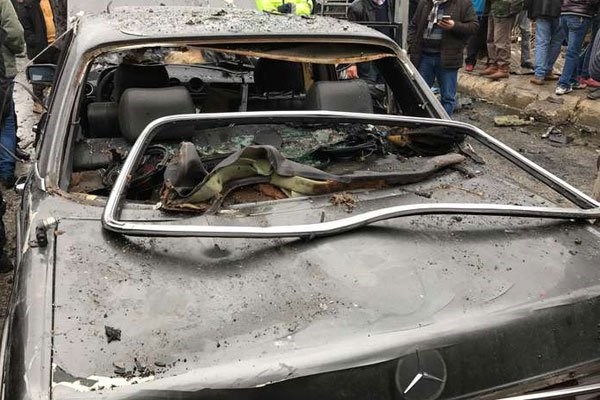
Sunday, January 08, 2017

Syrians look at a destroyed vehicles as they gather at the site of a car bomb explosion in Syria's coastal city of Jablah, a bastion of the regime, on January 5, 2017. A tanker exploded today killing 43. PHOTO | AFP
BEIRUT
A massive tanker truck bomb ripped through a market by a courthouse in the rebel-held Syrian town of Azaz on Saturday, killing 43 people and wounding dozens near the Turkish border.
The attack appeared to be the deadliest yet in the town in northern Aleppo province, which has been regularly hit by bombing targeting rebels and civilians.
The Britain-based Syrian Observatory for Human Rights said at least six rebels were among the dead, but most of those killed were civilians.
Observatory chief Rami Abdel Rahman said identification of the dead was being hampered by the fact that some bodies were completely burned in the blast.
Video from the scene showed huge clouds of smoke rising from a street filled with debris and twisted metal, which bulldozers were working to clear.
Raging fires were burning in several vehicles, and the fire brigade was battling to put them out with a giant water tanker and hoses.
Azaz has been repeatedly struck by bomb attacks, including in November when rebels said 25 people — civilians and opposition fighters — were killed in a car bombing of a rebel headquarters.
The rebels accused the Islamic State group of being behind that attack.
The jihadist group is present elsewhere in Aleppo province and has sought to advance on Azaz in the past.
In October, at least 17 people were killed in a car bomb attack on a rebel checkpoint, the Observatory said.
TRUCE IN JEOPARDY
There was no immediate claim of responsibility for Saturday's attack, but Osama al-Merhi, a lawyer at the scene of the blast, pointed the finger at IS.
"These kinds of crimes are only committed by the terrorist group Daesh," he said, using an Arabic acronym for IS.
"They are the ones who target civilians and the cadres who are building this country," he told AFP.
The blast comes during a fragile nationwide ceasefire brokered by government ally Russia and rebel backer Turkey.
The truce came into effect on December 30, and is intended to pave the way for new peace talks in Kazakh capital Astana, which regime ally Iran is also helping organise.
But the ceasefire and the planned talks have been threatened by ongoing violence in the rebel-held Wadi Barada region outside Damascus, which is the main water source for the capital.
Overnight, the Observatory said seven Syrian soldiers and two civilians were killed in clashes, though the fighting appeared to have calmed by late Saturday morning.
Fighting in the region has continued despite the truce, which does not apply to IS or former Al-Qaeda affiliate Fateh al-Sham Front, known previously as Al-Nusra Front.
The government says Fateh al-Sham is present in Wadi Barada, and blames rebels there for cutting water to Damascus since December 22.
Rebels deny the jihadist group is in the region and say the mains supply was severed after government strikes hit pumping facilities in the area.
The damage has left 5.5 million people in Damascus and its suburbs without water, according to the UN.
TALKS SUSPENDED
On Saturday, state media said maintenance teams had arrived in the area 15 kilometres (10 miles) northwest of Damascus and were "prepared to enter" to begin repair work.
A source close to the regime said a temporary ceasefire had been agreed to allow the repair crews to enter, though it could take days before the mains supply is restored.
But there was no official confirmation of a deal or the entry of the repair crews.
More than 310,000 people have been killed in Syria since the conflict began in March 2011 with anti-government protests.
The fighting has displaced more than half the population, internally or abroad, and proved stubbornly resistant to international attempts to broker a political solution.
Turkey and Russia want to convene negotiations in Astana later this month, but rebels have suspended participation in preparatory talks, blaming regime "violations" in Wadi Barada.
Elsewhere, an alliance of Arab and Kurdish fighters backed by US special forces moved to within four kilometres of the Tabqa dam held by IS, the Observatory said.
The monitor said the Syrian Democratic Forces had taken the last IS-held village between them and the dam on the Euphrates, which is the country's largest.
The dam is just 500 metres (yards) from the town of Tabqa, where many senior IS commanders have been based.